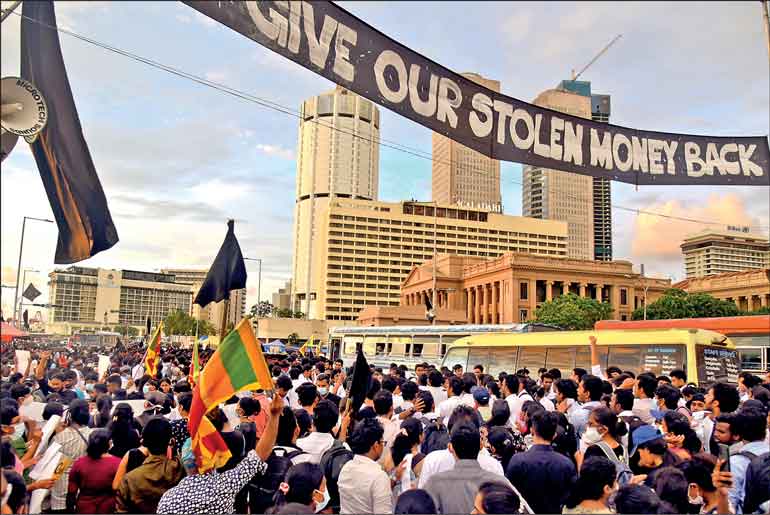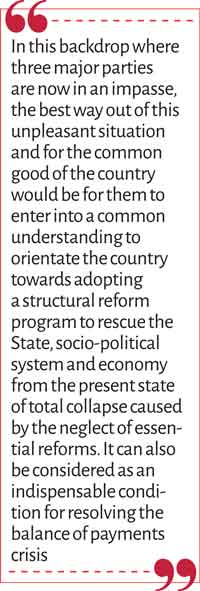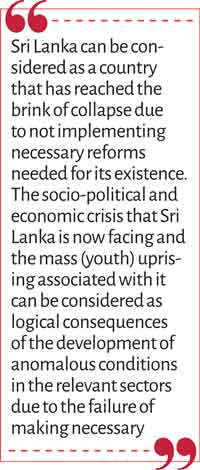Saturday Feb 14, 2026
Saturday Feb 14, 2026
Friday, 6 May 2022 00:08 - - {{hitsCtrl.values.hits}}

At the moment, the Government is in crisis. The Opposition parties are also in crisis. The public or youths uprising is also in crisis
Produced below is a document prepared by me to be used as a guiding document at a discussion to be held in a forthcoming forum of people’s representatives on the mass uprising led by the youth, their aspirations and how their aspirations could be put to a constitutional framework.
aspirations and how their aspirations could be put to a constitutional framework.
At this crucial moment, the country is in an extremely precarious and chaotic situation. The economic and political crisis has reached an explosive height. Conducting the affairs of the country regardless of essential reforms and without rectifying serious mistakes committed from time to time can be considered as the main reason for the multifaceted crises facing Sri Lanka today. There are many examples to show how certain issues which should have been corrected then and there, have developed into shoddier situations as necessary reforms to rectify them were not introduced at the right time.
For example, several communal riots including ’83 Black July burst out in the country from time to time. No attempt has been made to look into the cause of these riots and make necessary reforms to prevent recurrence of such incidents. Three youth insurrections broke out in the Sinhala South and Tamil North from time to time causing great loss of life and property. No attempt has been made to look into the reasons why the Sinhala and Tamil youth had plunged themselves to such insurrections.
In the sphere of education, the system adopted for classification of schools is unscientific. It is a corrupt system that promotes solicitation of bribes when students are enrolled in schools. This system has caused the poor to inherit marginal or under equipped schools which lack adequate facilities. The system of instruction used in schools which is based on rote learning or memorising that blunts the creative abilities of children is also outdated and stupid.
Since the late 1970s, the Department of Immigration and Emigration and the Department of Registration of Persons had maintained a system in which both genuine and fake passports and identity cards had been issued at the same time, respectively. The issuance of fake IDs had gone so far that the CID was able to reveal an incident in which the Head of the Bureau in charge of the IDs had issued a stock of identity cards to the LTTE for its use. The Sri Lankan passport has the lowest recognition in the world. It was known for long that these two institutions have been issuing fake passports and national identity cards respectively. But to date nothing positive has been done to rectify this ugly practice.
Sri Lanka has a National Security Council (NSC), but it is not an entity instituted legally. Since the enactment of the ’78 Constitution, all elections have been held in the absence of any rules or restrictions to monitor election funds, candidate funds and election expenses. In this backdrop, black money plays a dominant role in the electoral process. It can be considered as an ugly situation that was obvious to anyone. Consequent to the President, the Head of the state who is vested with all the power in the State was placed above the law by the ’78 Constitution, all the Presidents who came to power from time to time continued to gang up with the ruling party MPs and plunder the country’s wealth. Thereafter, the entire system of public institutions became rotten with rampant corruption.
restrictions to monitor election funds, candidate funds and election expenses. In this backdrop, black money plays a dominant role in the electoral process. It can be considered as an ugly situation that was obvious to anyone. Consequent to the President, the Head of the state who is vested with all the power in the State was placed above the law by the ’78 Constitution, all the Presidents who came to power from time to time continued to gang up with the ruling party MPs and plunder the country’s wealth. Thereafter, the entire system of public institutions became rotten with rampant corruption.
No attempt has been made to change this ugly situation; even the 19th Amendment didn’t attempt to make a real difference except for hiding it under a deceptive cover. The dominance of the President over the fiscal management of the country too, has been an important factor impacting the balance of payments crisis. Despite the apparent balance of payments crisis, the IMF was not approached initially, because the president too was of the belief that it was not necessary to seek the intervention of the IMF. These include only a few instances where the situation has become worse due to ignoring the necessary reforms. The overall scenario in the country in this regard is extremely shocking and deplorable.
Sri Lanka can be considered as a country that has reached the brink of collapse due to not implementing necessary reforms needed for its existence. The socio-political and economic crisis that Sri Lanka is now facing and the mass (youth) uprising associated with it can be considered as logical consequences of the development of anomalous conditions in the relevant sectors due to the failure of making necessary reforms.
At the moment, the Government is in crisis. The Opposition parties are also in crisis. The public or youths uprising is also in crisis. The Government has lost its capacity to control the challenges posed by the youth uprising and the Opposition and to regain the political dominance it had acquired in the political arena. Even the Opposition has not been able to exhibit political power over the Government. The youth uprising too, as per their slogan has not been able to send Gota home or “achieve a profound systemic change” which could be considered as the real purpose of their struggle. In this backdrop, all three opposing forces are now in a stalemate.
The younger generation which represents the youth uprising has dashed the Government which commanded a powerful position, on the floor. But they couldn’t overthrow it. But, it has caused a big fracture in the backbone of the Government that could not be remedied back to its original position. Yet, so far, neither the youth nor the Opposition which has done this damage has been able to defeat the Government albeit it is now in a weak position. The programs put forward by both parties to defeat the Government can be considered as utopian programs based on wrong calculations. This situation has deprived the possibility of building consensus in Parliament which is needed for restoring financial stability, a key condition required for resolving the balance of payments crisis. The Parliament is now, to a great extent, in an anarchic state. The Presidential system in Sri Lanka has been designed in such a way that the incumbent President and his parliamentary government cannot be defeated by any means outside the provisions of the Constitution; it could be done only by conforming to the provisions enshrined in the Constitution. Even in an event in which the President resigns, being unable to withstand the public pressure, there won’t be a presidential election held to elect a new president except for selecting a new President by Parliament for the remainder of his term.
means outside the provisions of the Constitution; it could be done only by conforming to the provisions enshrined in the Constitution. Even in an event in which the President resigns, being unable to withstand the public pressure, there won’t be a presidential election held to elect a new president except for selecting a new President by Parliament for the remainder of his term.
According to the Constitution, a President can be removed from his position by an impeachment motion only; but the impeachment process is designed in such a way that it will be to the advantage of the president and not to facilitate his removal. In addition to the power of presidency, the Pohottuwa party had nearly two-thirds majority in Parliament. Even after the public uprising, it still has the majority in Parliament. In this backdrop, an interim government cannot be formed without the consent of the Government. The idea that a few MPs appointed from the national list are removed and a few talented people should be brought in to the Parliament to form a healthy interim government is beautiful but hypothetical.
Such a thing can be done only if the Government gives its approval for that. No matter how big and strong the public uprising is, the Government will not lose its parliamentary representation under its pressure. If the ruling party members are not prepared to resign voluntarily, they will lose their parliamentary representation only in the event of dissolution of Parliament. A public uprising has the potential to plunge a government in power into a deep crisis; but those who lead the uprising will not become rulers or members of parliament automatically without an election. A strong and persistent policy of fighting until the president and the government are removed from power could cause irreparable damage to both parties and push the country into total anarchy.
In this backdrop where three major parties are now in an impasse, the best way out of this unpleasant situation and for the common good of the country would be for them to enter into a common understanding to orientate the country towards adopting a structural reform program to rescue the State, socio-political system and economy from the present state of total collapse caused by the neglect of essential reforms. It can also be considered as an indispensable condition for resolving the balance of payments crisis.
In order to restore the financial stability of the country, Parliament must reach consensus on the subject. The Parliament is now in a state of anarchy. Action can be taken to adopt an Interim Constitution and set up an All-party Interim Administration to carry forward the reform program; the functions of it could be summarised as follows.
1).Maintaining the day-to-day operations of the Government, implementing measures to resolve the balance of payments crisis, easing off the inflationary pressure, restoration of manufacturing sectors which have collapsed, and facilitating the reform program can be considered as main responsibilities of the Interim Administration. The All Party Interim Government should formulate an appropriate constitution, enact electoral laws required to achieve that, and act as the governing body of the country until an election is held.
2).Given the paramount importance of the balance of payments crisis, the responsibility of formulating an appropriate plan for resolving the crisis and implementing it could be assigned to a five-member Parliamentary Committee conversant with the subject of financing and fiscal policies. It is extremely important to formulate a macroeconomic plan conducive to restoring the financial stability of the country and providing necessary guidance for that. In addition to the Debt Restructuring Program, a conference of countries interested in assisting Sri Lanka could be convened at this crucial juncture. The responsibility of convening a conference can be delegated to a country like Japan.
responsibility of convening a conference can be delegated to a country like Japan.
If there is a structural reform program that meets with their approval and brings about a profound change in the country, such a summit alone could help raise a huge sum of foreign funds between $ 20-25 billion. A policy that supports a large number of young people with higher education (about one million) interested in working overseas can lead to a significant increase in foreign exchange remittances.
3).The countries like the European Union and the United States have recognised the suitability of using 15% of alcoholic products such as ethanol with car fuels. The amount of research done using a variety of raw materials in this respect is enormous. If Sri Lanka could adopt this alternative approach, the potential of improving the rural economy would be enormous, and the cost of importing petrol could be reduced by as much as 15%.
A policy that promotes business process outsourcing (BPO) also could help increase foreign exchange earnings. It can contribute to alleviating the problem of unemployment. A policy of reclaiming the revenue sources that had brought income to the treasury in the past and later usurped by politicians will also strengthen the streams of government revenue.
The Constitutional Assembly shall consist of Members of Parliament and elected representatives in a more appropriate manner. (a) Planning of entire reform program, formulation of interim constitution and drafting the new constitution should be done by the Constitutional Assembly. (b) The Constitutional Assembly shall be given necessary powers to carry out its functions by the Interim Constitution.
4).Reforms to be made (a) Building the Sri Lankan Nation, abolition of recognition accorded to feudal caste system, formulation of necessary policies, establishment of organisational methods, rules and regulations to grant equal human respect and equal rights to all ethnic, religious, sexual and cultural groups, and look into their grievances (b) Investigate the causes of deterioration of the judiciary; and with the assistance of the judiciary, introduce necessary reforms to create a strong, law-abiding, efficient and independent judiciary that will establish the rule of law. The judiciary should be given the complete power of review. No one should be allowed to be above the law. (c) Establish a bicameral legislature with a nominal President led by the Prime minister and a Cabinet of Ministers (d) Reforms that grant the public the power to exercise their democratic rights directly (to submit proposals to Parliament). (e) Reforms that force the internal functioning of political parties are to be pursued in democratic manner, and making the auditing of party funds compulsory, should be introduced. (f) Reforms needed for limiting election funding and election expenditure and subjecting them to audit shall be introduced. (g) Reforms that lead to the elimination of bribery and corruption should be introduced. Strict policies and regulations that do not allow the Head of state, Ministers, parliamentarians and government officials to misappropriate public property or to do business with the government should be introduced. (h) While looking into the costs incurred in maintaining politicians and senior government officials, a strict policy should be implemented to cut down all unnecessary and wasteful expenses. (i) Deliberate violation of the Constitution should be made a punishable offense and amendments to the Constitution which tend to distort or weaken the democratic essence of the Constitution should be made illegal.
5).The Nature of the Interim Administration, its responsibilities and the manner in which the Interim Administration ceases, the details of reforms to be made, the timeframe for their implementation, the powers of the Constitutional Assembly and the principles to be applied for making of a new Constitution, how the Constitution should be framed in accordance with those principles and how the public should be actively involved in it, how it should be reviewed in the judiciary once the formulation of the Constitution is finalised, how it should be ratified through a referendum, and if the reform program is implemented in two stages, the details of the tasks to be completed in each phase and their timeframe, how the government that comes to power after the end of the interim government following an election should assume power, how the new government that comes to power should complete the second phase of the process entrusted to it and how the changes of the Constitution Assembly should be made in these two phases – all these aspects should be clearly specified in the interim constitution.
It is important that the United Nations should also be involved as an observer in this reform program. Such a reform program will certainly help eliminate the tense conflict prevailing at the moment between three opposing forces for political supremacy and the state of anarchy associated with it, and provide the necessary impetus and capacity to make a “positive and profound change in the system” which is an essential condition for the survival of the country and also, can be seen as the main aspiration of the younger generation that has come on to the streets in protest. It will also help Sri Lanka to resolve the balance of payments crisis and emerge as a united and strong country and also create a favourable socio-political and economic environment in the country.